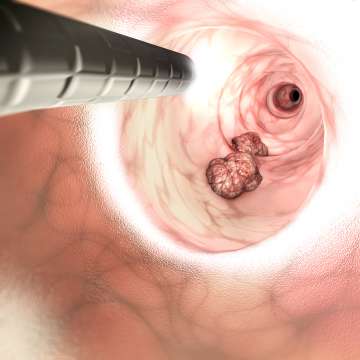Colonoscopy Preparation
Find your care
You receive customized, exceptional diabetes treatment and education in a caring environment. Call 310-825-7922 to connect with a diabetes specialist.
Colonoscopy preparation for insulin pump/injections
The preparation for a colonoscopy can affect your blood glucose levels as it usually includes a change in your meal plan and a series of laxatives.
On the day of the colonoscopy, you will not be able to eat starting at midnight. As a result, you will need to make changes to your insulin doses and frequency of blood glucose monitoring. Your blood glucose may be less well-controlled than usual.
It is most important to avoid low and severe high blood glucose before the procedure. To avoid this problem, your appointment should ideally be scheduled for the early morning, but occasionally, it may be scheduled in the afternoon.
Consult your diabetes team prior to making any changes to your regimen but remember the following for safety.

Day before the procedure
- Check blood glucose every 4 hours.
- Keep yourself well-hydrated.
- Drink clear fluids containing 15 grams of carbohydrates. It is recommended that you consume clear fluids every 2 hours, distributed at breakfast time, mid-morning, lunch time, mid-afternoon, dinner, 2-3 hours after dinner and at midnight. Aim to have around 30-45 grams of carbohydrates at a time. You can take 45 grams of carbohydrates at mealtime and take non-carbohydrate liquids between meals if you want to limit the number of boluses you take.
Examples of 15g carbohydrate:
- ½ cup clear apple juice, ½ cup white grape or white cranberry juice
- ½ cup lemonade
- ½ cup carbonated beverages such as 7-Up, ginger ale, Sprite
- ½ cup clear Jell-O
- 8 oz. Gatorade (not containing red dye)
- 4 glucose tablets
Items without carbohydrate that can be taken as desired throughout the day:
- Water
- Diet soda
- Tea
- Coffee without milk or cream
- Diet Jell-O (clear)
- Clear broth
- Managing your insulin (consult your provider prior to making any of the changes below):
- Keep your basal rate the same during the day. Consider decreasing your basal rate to 80% (-20%) for the 24 hours when you start taking the laxative.
- Take insulin for the carbohydrates you eat and correct for high blood glucose as usual.
- Check your blood glucose before bedtime:
- If the blood glucose is below 140 mg/dl, have 15 grams of carbohydrates and check blood glucose during the night.
- If the blood glucose is less than 120 mg/dl, drink 15 grams of juice (clear) and re-check the blood glucose every 15 minutes until the level is over 120 mg/dl. Check blood glucose again in the middle of the night.
- If the overnight blood glucose is less than 120 mg/dl, drink 15 grams of juice (clear).
- Check your blood glucose before bed.
Colonoscopy preparation on the day of the procedure
- If you have low blood glucose (less than 70 mg/dl):
- Take 3 glucose tablets initially and wait 15 minutes to re-check blood glucose.
- Take additional tablets if necessary, until the blood glucose rises to over 120 mg/dl.
- Make sure to tell the medical staff if you have hypoglycemia.
- Check blood glucose upon waking and every 4 hours until you resume your usual schedule after the procedure.
- If you are using an insulin pump with a closed loop system, consult your diabetes team for specific instructions on how to adjust the basal.
- If you are on multiple daily injections, consult with your diabetes team for specific instructions on how to adjust the insulin doses.
- Take your insulins, pump, all pump supplies, and glucose monitor/meter with you. Discuss with your procedure team about staying connected to your pump throughout the procedure to prevent delayed severe hyperglycemia/DKA. Do not stop your insulin or you may be placed at risk for DKA.
- You can bring a packed meal to avoid a delay in administering your insulin dose after the procedure.
- After the procedure, resume your usual basal rate and boluses when you can eat a normal meal.
Insulin Pump Use for Colonoscopy Preparation English PDF
Preparación para la colonoscopia bomba de insulina PDF